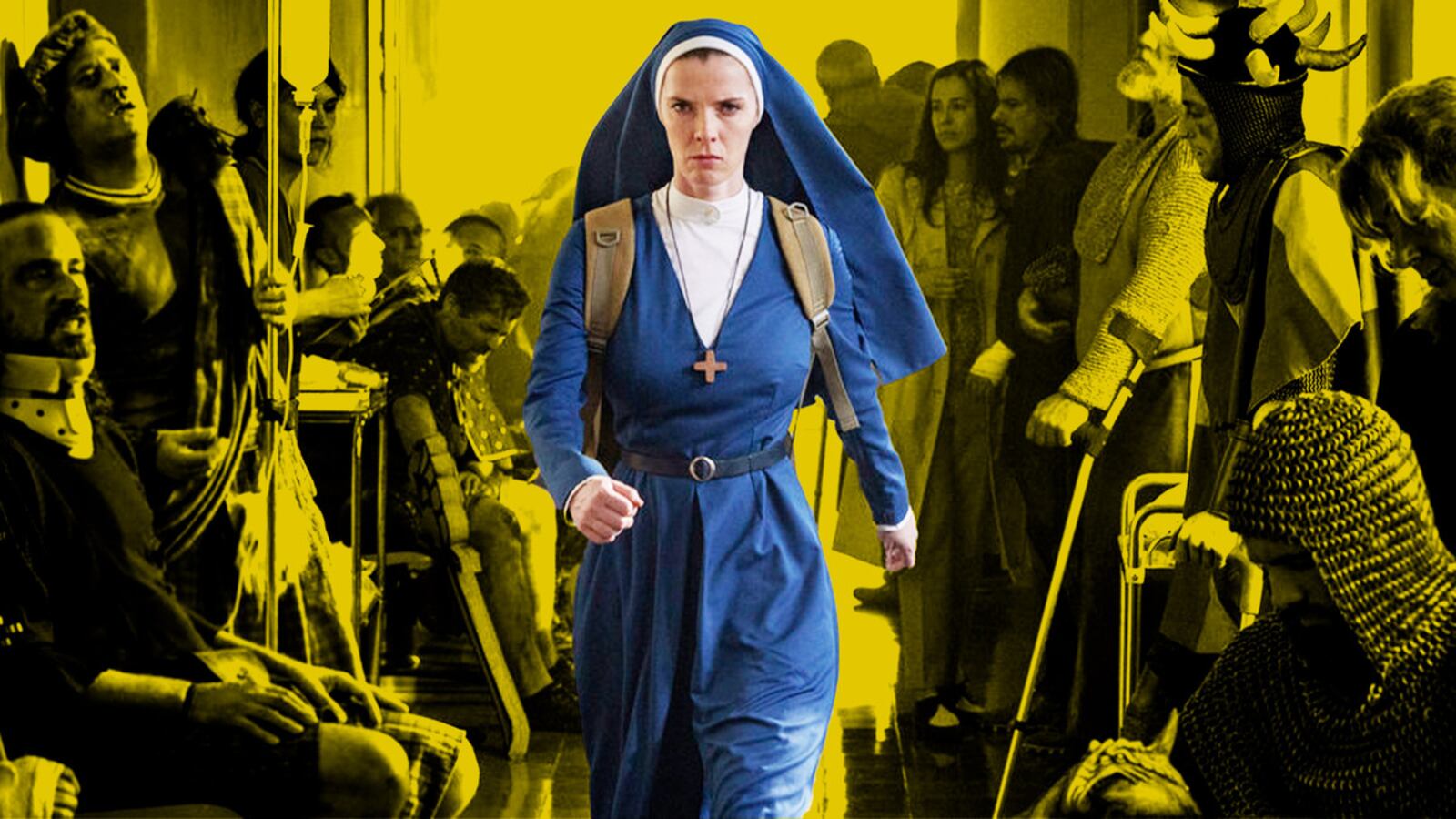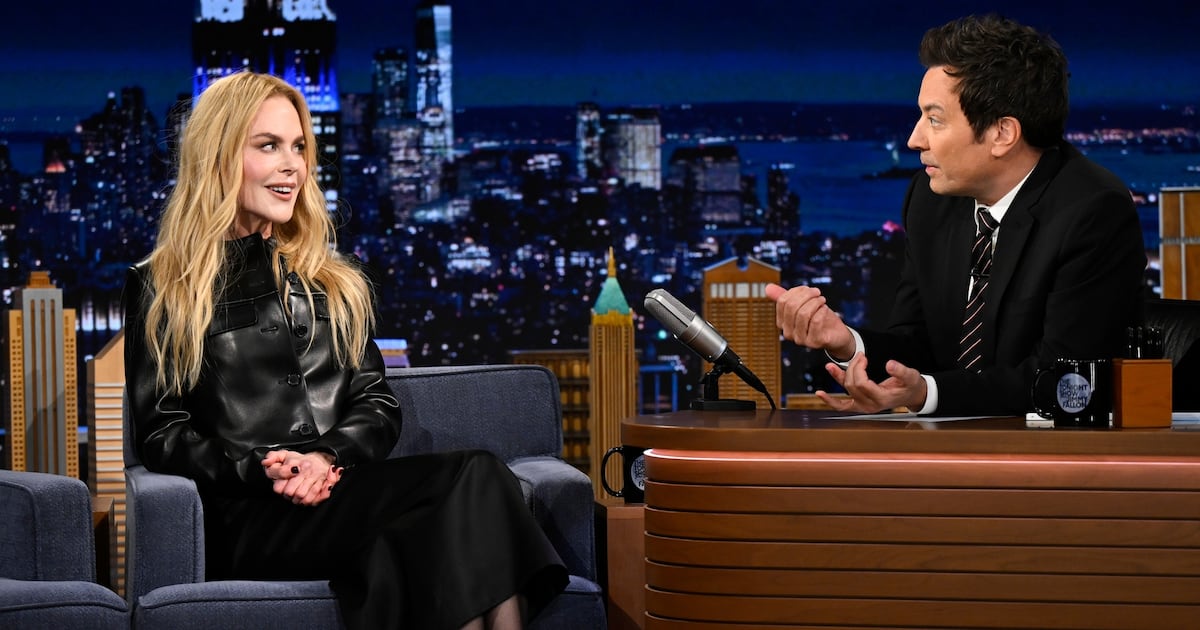The show is about a nun. She’s a bit of an action hero. She was raised by mid-tier magicians in Reno. Intent on destroying an artificial intelligence system that she thinks is responsible for everything bad in the world, she goes on a mission to find the actual Holy Grail and battles Nazis on the way. Also, her boyfriend is Jesus—as in…Jesus—and their makeout sessions are really hot.
The Peacock series Mrs. Davis, whose finale premieres Thursday, is so gonzo-bonkers-wild-unique, as per that bizarre smorgasbord of themes and plots, that it seems like a computer just generated random TV concepts and compiled them into a series. (It’s also unintentionally timely, airing amid a contentious discourse about AI and its potential role in scripting and replacing TV writers in the future.) But it’s also so clever, fresh, and different that only twisted human minds could come up with it. In the case of Mrs. Davis, those minds would be Damon Lindelof and Tara Hernandez, who created the show together.
“It is a bit like ‘pass the blunt,’ or like that game where you go, ‘I’m gonna write a page, and then you're gonna write a page,’” Hernandez tells The Daily Beast’s Obsessed. “And you get it back, and you’re like, ‘Who added the Nazis? Who the fuck did that? Now I have to solve for these guys?’”
Lindelof compares it to “a buffet on a cruise ship,” adding, “There’s just everything that you could possibly want. Like, do you want waffles? Do you want the omelet station? How about some sushi?”

With the entire eight-episode season of Mrs. Davis now available to watch, it’s a good time to ask Lindelof and Hernandez the most pressing question about the series, which is: What the hell?
Emmy-nominee Betty Gilpin stars as Simone, who is forced to leave the convent, where she had delighted in making jam with her fellow sisters in between various crime-fighting missions, when an AI system named Mrs. Davis drafts her to track down the long-missing Holy Grail. Mrs. Davis has, in many ways, replaced religion in society, with people now looking to it for the answers they used to seek from their faith. Simone is skeptical of it all: of Mrs. Davis, of the magic that traumatized her growing up as a child of magicians, and this whole Holy Grail thing. But she accepts this mission, because, if she completes it, she might be able to destroy Mrs. Davis for good.
“In the writers room, we had a list of what we called ‘Grail expectations,’ which means, when you do these sorts of adventure stories, what do you expect?” Hernandez says. “I expect an Indiana Jones adventure that often involves Nazis. There's going to be swashbuckling. There's going to be a sword. The question becomes, how do we hit those markers that are familiar to people? It became, yeah, that’s Indiana Jones-y, or that’s DaVinci Code-y, and we embraced it. It’s OK to feel like these are tropes. We’re dealing with an algorithm.”
“I have come to believe that as long as there is a character in the show—and they're not looking at the camera and winking—but as long as they are saying, ‘I am also frustrated by this wackiness,’ it works,” Lindelof says. “It's when all the characters are ready to get on the train to Absurdville, that’s when you start to lose it. So you find an audience proxy, preferably your main hero. And for a nun to be the most grounded character in the show, given what a nun's belief systems are, that felt like a very unique challenge.”
Lindelof is best known for co-creating the series LOST, The Leftovers, and Watchmen. Hernandez spent nine years as a writer on The Big Bang Theory and its spinoff, Young Sheldon. That those respective résumés seem tonally mismatched is exactly why Lindelof knew Hernandez would be a perfect partner for a project as subversive as Mrs. Davis.
Coming out of working on Watchmen—and a traumatizing pandemic—Lindelof craved a break from making dark TV and the punishing schedule of solo showrunning. For his next show, he wanted to work on something lighter. He also wanted to partner with someone who had TV-writing experience and would be eager to take on showrunning responsibilities. Lindelof estimates that he was sent roughly 150 scripts from potential writers to consider, including one called Mercy House from Hernandez.
In the Mercy House story, everyone is born with an expiration date and the knowledge of when exactly they are going to die. Children with sooner expiration dates are often dropped off at an orphanage run by nuns. “It was really about these women and how they found some amount of light and humor in it, and [it] asked the question of whether that [outlook] made sense in a world that was so dark,” Hernandez says.
“It had lift,” Lindelof says of the script. “When I told my wife this is the premise of this thing but also said that it’s fun, she was like, ‘You’re fucking weird.’”
“When [Lindelof] found it hilarious, I was like, that says more about you…” Hernandez says, laughing.
Lindelof had cut his teeth working on broadcast series like Nash Bridges and Crossing Jordan, and he liked that Hernandez had such an extensive background in working on a network multicam sitcom. “I’m gonna be an old man talking about, ‘Back when I was young…,’ but with the broadcast model, you really learn the formula,” Lindelof says. “There are so many people who come into TV, and they’re like, ‘I want to break the formula.’ And that's fine. But all they’ve done is watch it. They’ve never actually gone into the lab and made it. So it would be like me saying, ‘I’m going to change the way that chicken cacciatore is prepared,’ but I’ve only eaten it. I’ve never actually made it.”
Mrs. Davis evolved through extensive meetings and conversations between Lindelof and Hernandez. Two topics that were key starting points: nuns and AI.
“My affection for nuns specifically is that I love characters of passion,” Hernandez says. Nuns also tend to be a canvas for extremism in pop culture: rigid and punishing, lamby and pure, or a fetish. “They’re a costume to us, really. When we were building a pitch deck of references, we stumbled on as many legitimate photos as we did of sexualized nuns or Halloween nuns. They’re so removed from our society. They’re just an image. They’re a habit. They’re a thing.”
With Simone, she and Lindelof wanted to subvert those stereotypes.
The artificial intelligence aspect of the show stemmed from the field’s bubbling omnipresence in the news—but also, in an unexpected way, from the pandemic. While pondering the ethics of AI—like how dastardly the technology could become—Lindelof saw a world in which it could be useful, even comforting. In Mrs. Davis, the tool is so helpful and meaningful that it essentially replaces religion.

That premise was born partially from a simple thought Lindelof had during the pandemic lockdown. When there was so much uncertainty about what was safe and what precautions were actually necessary, wouldn’t it have been nice to ask an AI these questions and be given a definitive answer? But even that possibility comes with complications, which Mrs. Davis has explored throughout the season.
“Algorithms don’t understand what it means to be human, because they're not human,” Lindelof says. “If you ask an algorithm, ‘Do I need to disinfect my groceries?’ and it had all the data that it needed to know that COVID didn’t live on fomites, and you were safe, what it wouldn’t take into account is that, in those early days of the pandemic, disinfecting our groceries actually created an emotional effect. It was a ritual that made us feel like we were safe, when we were all feeling like we were powerless and completely and totally in danger.”
The series, then, marks another instance in which a show that Lindelof had a part in creating has proven remarkably prescient to issues that are seizing the zeitgeist. 2019’s Watchmen, which was imagined as a sequel to Alan Moore’s influential 1986 graphic novel, aired as the systemic problem of police brutality, especially against people of color, became an urgent, national conversation. The series’ depiction of corrupt policing, white supremacy, and the institutions that enabled it was incredibly timely.
Now, with AI services like ChatGPT alternately fascinating and concerning people, and the Writers Guild of America considering the potential role of AI in screenwriting to be a major issue in their contract negotiations, Mrs. Davis is just as resonant.
“When Watchmen came out, it wasn’t like reparations or systemic injustice in policing weren't things that everybody knew about,” Lindelof says. “It was all bubbling there under the surface. I wish that we didn't live in a country where watching Watchmen seemed prescient. All the Black writers on the show were basically like, ‘Watchmen was 40 years too late.’
“With AI, the conversation has become much sharper now, centered around ChatGPT,” he continues. “I’ll be honest with you. If I could pay $25 an hour and get good therapy from a bot, as opposed to a human—and that’s what I can afford—I’m down for that, if that makes me feel better. Has it taken my therapist’s job away? Yes. Now, my therapist has to charge 25 bucks or be better. That makes me as a writer think, ‘Oh, now it's coming for me,’ though.”
Note: Only humans were involved in the writing and reporting of this story.
Keep obsessing! Sign up for the Daily Beast’s Obsessed newsletter and follow us on Facebook, Twitter, Instagram and TikTok.






